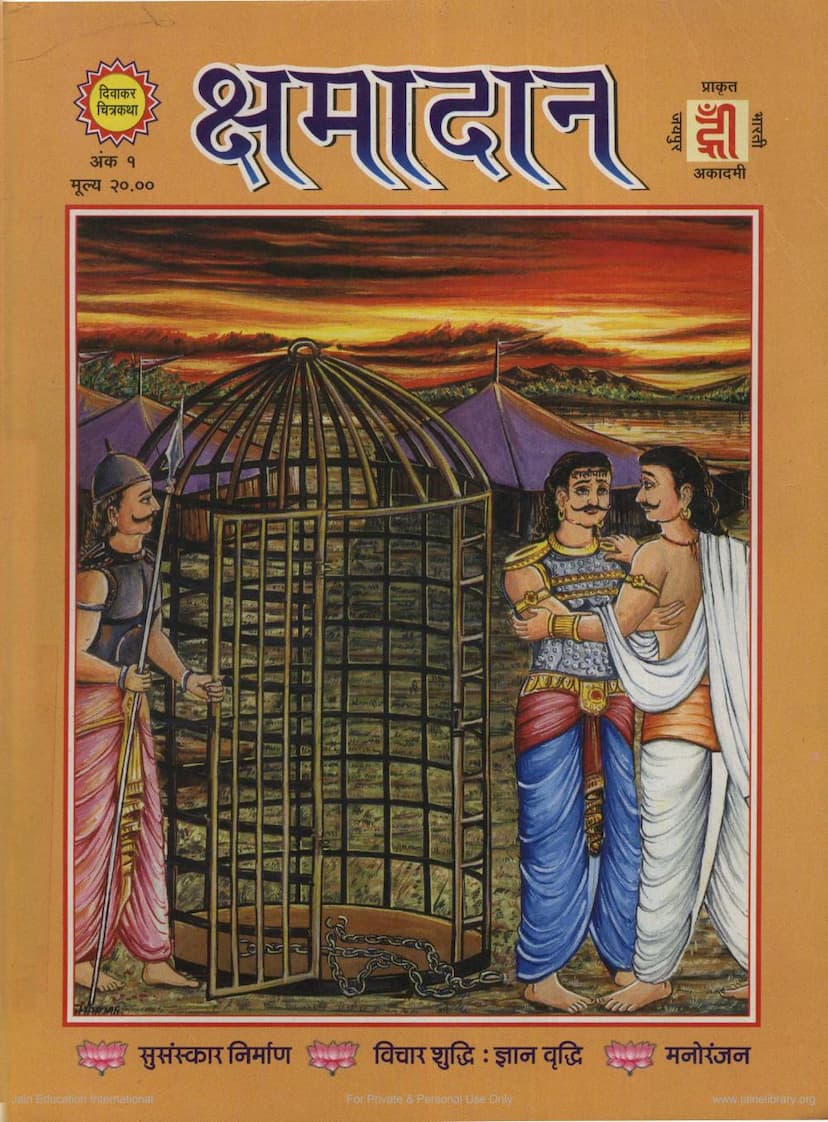Kshamadan Diwakar Chitrakatha 001
Added to library: September 2, 2025

Summary
Here's a comprehensive summary in English of the Jain text "Kshamadan Diwakar Chitrakatha 001":
This comic book, "Kshamadan Diwakar Chitrakatha 001," authored by Upadhyay Shri Keval Muni Ji and edited by Shri Chand Surana 'Saras', published by Shree Diwakar Prakashan, focuses on the concept of Kshama (Forgiveness) as a supreme virtue in Jainism. The narrative uses a historical event to illustrate its profound importance and impact.
The central theme is that true happiness lies in forgiveness, and it's the balm that heals wounds of enmity, hatred, bitterness, and animosity. Jainism considers forgiveness the foundation of friendship, which is why Paryushan Parva is celebrated as a festival of forgiveness and friendship.
The story revolves around King Udayan of Sindhu (Sauvir) country and King Chandpradyota of Ujjaini. Both were sons-in-law of King Chetak of Vaishali. While King Udayan was a brave, ethical, and religious ruler, Chandpradyota was known for his arrogant and harsh nature, with a particular weakness for women.
The conflict arises when Chandpradyota, driven by lust for the beauty of Swarnagulika, a maidservant of King Udayan, becomes Udayan's enemy. A fierce battle ensues, and Udayan, a skilled archer, captures Chandpradyota.
Later, Queen Prabhavati, a devout follower of Lord Mahavir, inspires King Udayan, who embraces the principles of Ahimsa (non-violence) and compassion. During the Samvatsari festival, a day of seeking forgiveness from all beings, Udayan extends his forgiveness to his captive enemy, Chandpradyota. Chandpradyota, however, challenges Udayan, stating that true forgiveness can only be offered after his release.
In a remarkable act of forgiveness, Udayan releases Chandpradyota, forgives all his transgressions, and embraces him with love. This gesture deeply touches Chandpradyota, who acknowledges Udayan's greatness. King Udayan, by embodying the practice of forgiveness, sets an ideal example of a "Kshama-Veer" (Hero of Forgiveness). This inspiring event is historically recounted in ancient Jain literature like the Trishashtishalaka Purusha Charitra.
The narrative then elaborates on King Udayan's virtuous reign and his devotion to Mother Bhavani. Initially, a tradition of animal sacrifice during festivals existed, which Queen Prabhavati questioned, deeming it a grave sin. She proposed a test: to leave some animals in the temple overnight, and if they survived, the sacrifice would be discontinued, indicating Mother Bhavani's unwillingness to accept them. The test was agreed upon, and the next morning, all the animals were found alive and well, leading King Udayan to abolish animal sacrifice and declare a ban on hunting and animal sacrifice in his kingdom. This event marked a significant transformation in Udayan's life, leading him to follow the principles of truth, non-violence, and forgiveness taught by Lord Mahavir.
The story then introduces Dharmasar, a merchant from Magadha, who visits Udayan's kingdom for trade. He presents a beautiful pearl necklace to Queen Prabhavati, Udayan's wife. This leads to the introduction of a maidservant named Kubja, who, despite her physical deformity, possesses a noble heart. Dharmasar, impressed by Kubja's service, gifts her a divine amulet that, when consumed on a full moon night, will transform her appearance. Kubja consumes the amulet and becomes incredibly beautiful, earning the name Swarnagulika (Golden Flower).
This transformation becomes known to Chandpradyota of Ujjaini, who is known for his arrogance and lust for beautiful women and rare objects. He sends his envoy, Lohangh, to Udayan's court with a portrait of Swarnagulika, demanding her. Udayan, enraged by this insult and the abduction of Swarnagulika by Chandpradyota, prepares for war.
A significant battle ensues between Udayan and Chandpradyota, where Udayan's superior skills and divine weapons prove victorious. Chandpradyota is captured and brought before Udayan. Despite Chandpradyota's defiant stance and refusal to apologize, Udayan, recognizing that it is the Samvatsari festival, makes the profound decision to forgive his enemy. He orders Chandpradyota's release and embraces him as a brother, demonstrating the ultimate power of forgiveness and the true spirit of the Jain festivals. The story concludes with the resounding cheers of "Kshama-Veer Maharaj Udayan ki Jai" and "Kshama Veerasy Bhushanam" (Forgiveness is the Ornament of the Brave), celebrating Udayan's exemplary act.
The book also includes promotional material for other Jain comic books and literature available from Diwakar Prakashan, emphasizing their role in educating and imparting values. The overall message is a powerful testament to the transformative and unifying power of forgiveness in personal life and in resolving conflicts.